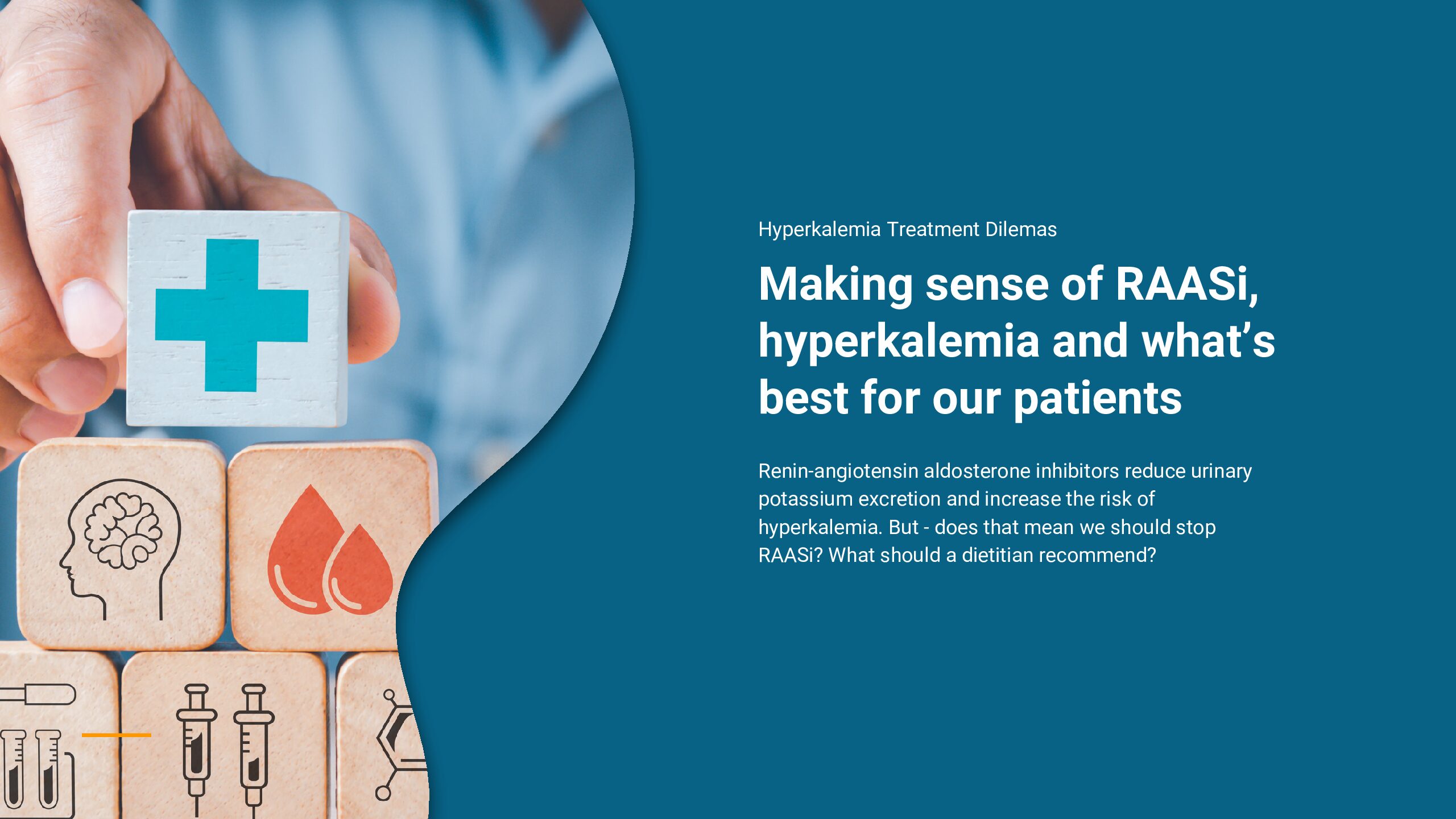In my new hyperkalemia assessment checklists there is a section that reviews medications associated with hyperkalemia.
One of the medication classes frequently associated with hyperkalemia are the Renin Angiotension Aldosterone System Inhibitors (RAASi).
I remember not too long ago when I got a consult for hyperkalemia and saw that a patient was RAASi, that I would ask my nephs to stop it. Phew – that was a hard sentence to write. Why? Because it feels like a confession. Because based on what I know now, I no longer think I was doing the right thing.
What are RAASi?
The two most common RAASi are known as ACEs and ARBs. (Eek, so many accronyms!) ACEs (often said “aces”) are angiotensin converting enzyme inhibitors and often end with a “pril”. Examples are:
- Ramipril
- Perindopril
- Captopril
- Enalapril
ARBs (often said “arbs”) are angiotensin 2 receptor blockers and often end in “sartan”. Examples are:
- Candesartan
- Irbesartan
- Olmesartan
- Telmisartan
The easy description of them is that they are “blood pressure pills”. But this is an over-simplified description of the benefits of these medications. See below for Why.
Mineralocorticoid receptor antagonists (MRAs) also impact the RAAS and are also commonly associated with hyperkalemia. Examples are:
- Spironolactone
- Eplerenone
What are the benefits of RAASi?
According to this article, RAASi are recommended for hypertension, heart failure, coronary artery disease, kidney disease and diabetes. In fact, Diabetes Canada, has a care pathway that suggests starting RAASi regardless of blood pressure for adults living with diabetes, who are older than 55 and have a risk of cardiovascular disease or microvascular complications.
RAASi are associated with reduced mortality in adults living with kidney disease, heart failure, post MI (myocardial infarctions also known as heart attacks). They are associated with kidney protection for diabetic kidney disease and non-diabetic kidney disease.
Why are RAASi associated with hyperkalemia?
The easy answer is that RAASi reduces the amount of potassium in the urine. RAASi lowers potassium excretion by impacting aldosterone.
In the distal nephron and collecting ducts in the kidney, aldosterone stimulates potassium excretion through Sodium-Potassium ATPase pumps (Na/K-ATPase). Reduced aldosterone activity = reduced potassium excretion in the urine.
Can RAASi cause hyperkalemia in anuric patients?
Yes! The colon also has Na/K ATPase pumps that respond to aldosterone levels. In my clinical experience I have seen increases in serum potassium even among my anuric patients (patients who no longer pee). Not because of changes in potassium excretion in the urine but related to changes of potassium excretion in the stool.
But what’s worse for my patient – hyperkalemia or stopping RAASi?
Stopping or lowering the dose of RAASi.
RAASi therapy is associated with reduced risk of death in adults living with heart failure and this benefit is even greater for those at risk of hyperkalemia.
Compared to patients on the right dose of RAASi, patients with diabetes, kidney disease and heart failure on lower doses of RAASi had a higher rate of death.
The caveat to this is for potassium levels above 6.0mmol/L. According to this algorithm, if K is above 6.0mmol/L, the RAASi should be temporarily discontinued, potassium binders should be started and then RAASi therapy should be re-introduced.
What does that mean for the dietitians on the team?
It means that we need to work very hard to help our patients manage their serum potassium levels so that they can stay on this life-saving medication.
And by work hard – I mean complete thorough and comprehensive assessments of hyperkalemia and target meaningful interventions that can help either 1) lower dietary potassium intake or 2) increase potassium excretion or both.
The good news? I have evidence-based ideas on how to know if you need target 1 or 2 or both in my hyperkalemia assessment checklists.




2 thoughts on “What’s worse for my patients – hyperkalemia or stopping RAASi therapy?”